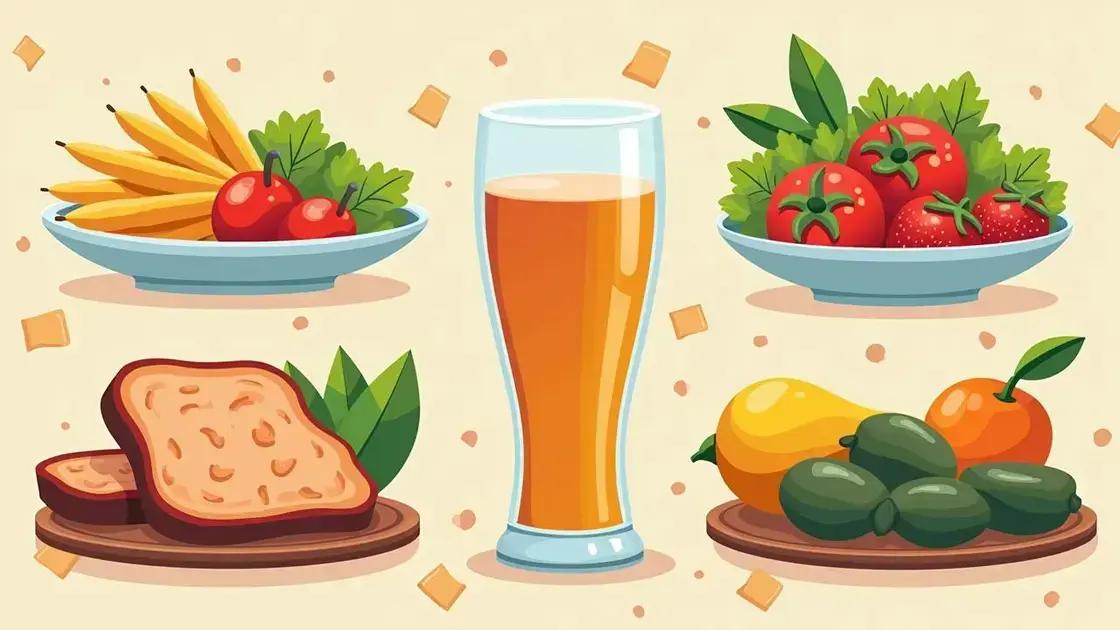Understanding whether African cucumber interacts with alcohol is essential for safe consumption. While there’s limited research on direct interactions, consuming alcohol with high-fat foods like African cucumber can slow alcohol metabolism, enhancing its effects. Safe drinking practices, such as eating beforehand, staying hydrated, and knowing your limits, can help mitigate risks associated with alcohol consumption.
Does African cucumber interact with alcohol? This question raises concerns about health and dietary safety. African cucumber, known for its unique benefits, is gaining attention in health circles. In this article, we’ll discuss its potential interactions with alcohol, the effects of alcohol on health, and safe consumption practices to enhance your well-being.
Understanding African Cucumber

African cucumber, also known as Kiwano or Acanthasicyos horridus, is a unique fruit originating from southern Africa. It has a spiky orange skin and bright green, jelly-like flesh. This exotic fruit is not only visually interesting but also offers several health benefits.
Nutritional Profile
African cucumber is low in calories and packed with nutrients. It is rich in vitamins like Vitamin C, which boosts the immune system, and Vitamin A, essential for eye health. Additionally, it contains potassium and magnesium, both important for heart health and muscle function.
Health Benefits
Consuming African cucumber can keep you hydrated due to its high water content. It is also a source of antioxidants, which help fight free radicals in the body. Furthermore, the fiber in African cucumber aids digestion, helping to maintain a healthy gut.
Culinary Uses
This fruit is often enjoyed raw, added to salads, or blended into smoothies for a refreshing drink. Its unique taste combines elements of cucumber, banana, and lemon, making it versatile in culinary applications. Chefs frequently use it in gourmet dishes for its aesthetic appeal and flavor.
Conclusion
Understanding African cucumber’s nutritional value and health benefits can help you incorporate this exotic fruit into your diet. Its unique properties make it a valuable addition to a healthy lifestyle.
Alcohol’s Impact on Health

Alcohol can have various effects on health, depending on the amount consumed and how often it’s taken. Moderate consumption can have some benefits, but excessive drinking presents significant health risks.
Short-term Effects
When alcohol is consumed, it affects the brain, impacting coordination, judgment, and reaction times. Even small amounts can lead to impaired function. Drinking a lot in one session can cause alcohol poisoning, which can be life-threatening.
Long-term Effects
Over time, heavy drinking can lead to numerous health issues. It can damage the liver, increasing the risk of conditions like cirrhosis and liver cancer. Additionally, it can lead to cardiovascular problems, including higher blood pressure and increased risk of heart disease.
Weight Gain and Nutrition
Alcohol is high in calories and can contribute to weight gain. Many alcoholic drinks also lack essential nutrients. This can lead to malnutrition, where the body doesn’t receive the vitamins and minerals it needs to function well.
Mental Health Risks
Alcohol use can also affect mental health. People who drink heavily may experience anxiety, depression, and other mental health issues. It is vital to recognize these risks and seek help if needed.
Interactions Between Foods and Alcohol

When consuming alcohol, it’s important to know how certain foods can interact with it. Some foods can enhance the effects of alcohol, while others can lessen its impact on the body.
Foods That Enhance Alcohol Effects
Foods high in fat can slow down the metabolism of alcohol. This means when you eat fatty foods and drink alcohol together, the alcohol may stay in your system longer. Foods like cheese, fried foods, and red meat are examples that can increase the effects of alcohol.
Foods That Lessen Alcohol Effects
Conversely, consuming foods rich in fiber and antioxidants, like fruits and vegetables, may help reduce the negative impacts of alcohol. Foods such as African cucumber, greens, and whole grains may assist in digestion and help with hydration.
Timing Matters
The timing of food consumption relative to drinking alcohol can also affect interactions. Eating before drinking can help reduce alcohol absorption, minimizing its effects. This is why having a meal before a night out is often recommended.
Hydration is Key
Staying hydrated is crucial when consuming alcohol. Mixing water or hydrating foods with alcoholic drinks can help prevent hangovers and maintain overall health. Fruits with high water content, like watermelon or African cucumber, can be effective choices.
Conclusion: Safe Consumption Practices

Practicing safe consumption of alcohol is essential for health and well-being. Here are some strategies to ensure responsible drinking habits.
Know Your Limits
It’s important to understand how much alcohol your body can handle. Everyone’s tolerance is different. Start slow and listen to your body’s signals.
Eat Before Drinking
Always consume food before or while drinking alcohol. Foods high in protein or healthy fats can slow the absorption of alcohol and help you feel better overall.
Stay Hydrated
Drink water between alcoholic beverages. This reduces dehydration, which is a common cause of hangovers. Staying hydrated is also vital for your body to process alcohol effectively.
Choose Lower Alcohol Content Beverages
Opt for drinks with lower alcohol content. Cocktails, light beer, and wine spritzers are examples that allow you to enjoy without overindulging.
Avoid Mixing Different Types of Alcohol
Mixing different types of alcohol can lead to unpredictable effects on your body. It’s best to stick to one kind of drink for the night.
Know the Interactions
Be aware of how certain foods may interact with alcohol. For instance, consuming high-fat foods can influence how alcohol affects you. Understanding these interactions helps you make better choices.
In Conclusion: Emphasizing Safe Alcohol Consumption
Understanding the interactions between African cucumber, alcohol, and overall health is crucial. By applying safe consumption practices, you can enjoy the social aspects of drinking without compromising your well-being.
Knowing your limits, eating before drinking, and staying hydrated can greatly reduce the risks associated with alcohol. Awareness of food interactions and choosing lower alcohol content beverages further enhances safety.
For a healthier lifestyle, prioritize these practices while enjoying alcoholic drinks. Always be mindful of how your body responds, and prioritize your health above all.
FAQ – Frequently Asked Questions about African Cucumber and Alcohol
Does African cucumber interact with alcohol?
While there is no definitive evidence, it’s essential to understand food interactions with alcohol and consume both responsibly.
What are the health benefits of African cucumber?
African cucumber is low in calories, high in water content, and packed with vitamins and antioxidants, which can aid in hydration and digestion.
How can alcohol impact my health?
Alcohol can affect coordination, judgment, and can lead to long-term health issues such as liver damage, weight gain, and mental health risks.
What are safe consumption practices for alcohol?
Knowing your limits, eating before drinking, staying hydrated, and opting for lower alcohol beverages are key practices for safe consumption.
What foods should I avoid when drinking alcohol?
Foods high in fat can slow down alcohol metabolism, enhancing its effects. It’s best to balance high-fat foods with fiber-rich alternatives.
Is it important to stay hydrated when drinking?
Yes, staying hydrated is crucial as it helps to prevent hangovers and reduces the negative effects of alcohol on the body.













